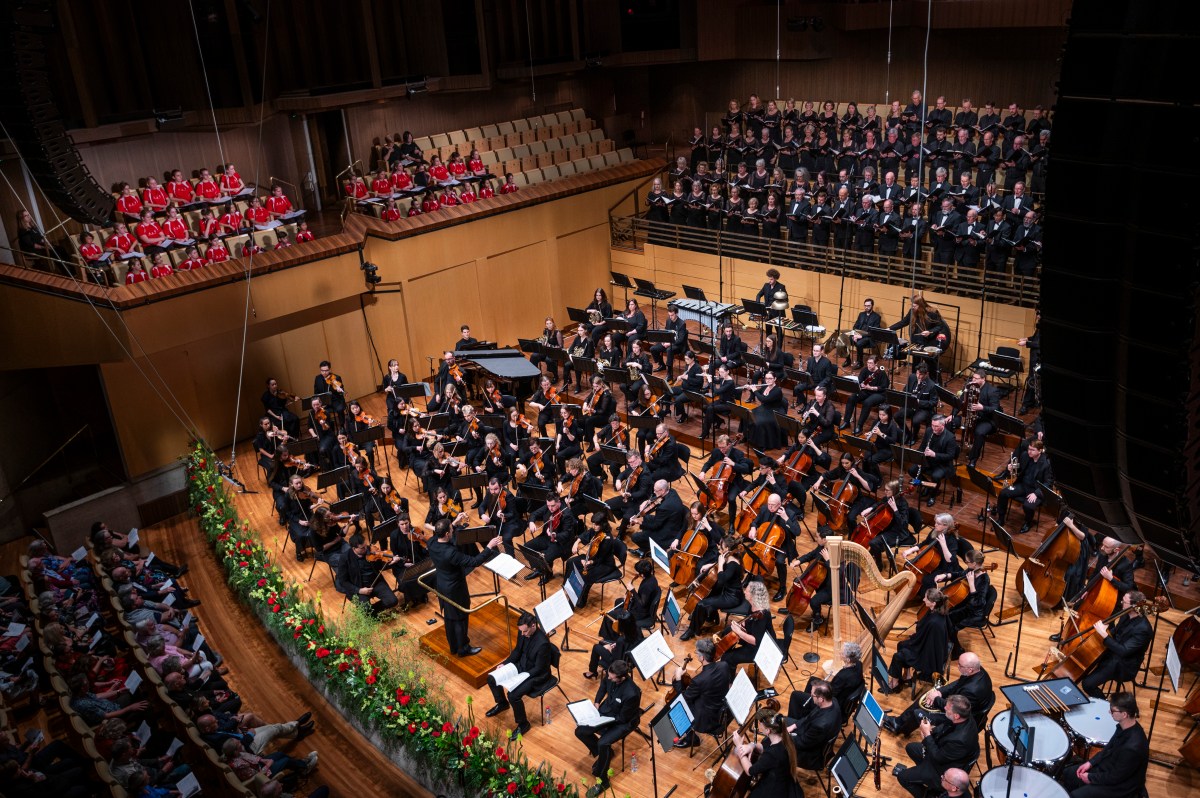Benjamin Britten’s War Requiem, Op. 66 is widely regarded as one of the great requiem masses offering a powerful musical statement about both the futility and the effects of war. It was commissioned to celebrate the opening of Coventry Cathedral in England in May 1962, after the previous medieval cathedral had been destroyed in the 1940 bombings in World War II.
Greeted with critical success on its first performance, it has enjoyed enormous popularity ever since. A marvellous work, it is technically well-crafted with evocative music full of pathos and dignity, well representing Britten’s pacifist views.
Britten took as his compositional guide the Latin Mass for the Dead (Missa pro defunctis) using nine prophetic poems written by the World War I poet, Wilfred Owen. Setting these to music, he interspersed them strategically within the six movements of the mass around chorus singing. Recognising the significance of the scale of this work, and what he hoped it may mean to future generations, Britten wrote his Requiem for enormous musical resources. It is scored for a large orchestra, a chamber orchestra, full adult choir, large children’s choir and three soloists, with close to 300 musicians and singers involved in its staging.
The tenor and baritone soloists sang Owen’s poems in English accompanied by the chamber orchestra. Close to the audience, their more personal interactions represented the victims of war. The main orchestra and chorus presented the mass, sung in Latin, with added colour from the soprano soloist. Finally, the children’s choir, accompanied by organ, offered a lighter, ethereal sonority denoting the voices of the innocent.
The first movement, ‘Requiem aeternam’, commenced with solemnity and an intensity of orchestral sound that helped set the scene for the whole work, while the gravity of the tolling bells was a forerunner to Owen’s first poem, Anthem for Doomed Youth.
The three soloists, tenor Andrew Goodwin, baritone Hadleigh Adams and soprano, Eva Kong, all gave excellent readings of their respective roles and sang beautifully, with passion and attention to detail.
Goodwin had some of Owen’s most beautiful poetry, his tenor perfect for this work with excellent diction and intonation. He gave a sensitive and moving rendition of Owen’s ‘What passing bells for these who die as cattle?’ and a glorious ‘Move him into the sun’ (from Futility) – easily interspersing his lines with those of soprano, Kong, and the main chorus.
Adams’ powerful and sweet baritone made the most of ‘Bugles Sang’ (from But I was looking at the permanent stars) and ‘Be slowly lifted up’ (from On seeing a heavy piece of artillery brought into action). Both soloists sang duets, often alternating in various sections of the poems, with ‘So Abram Rose (from The parable of the old man and the young) and Strange Meeting particularly effective.
Kong was positioned in the organ loft and her strong soprano soared above the chorus giving a welcome addition to the overall sonority, though in the final ‘In paradisum’ with organ and large orchestral forces to contend with, she was somewhat eclipsed.
Goodwin and Hadleigh were assisted in their delivery by the rock-solid support of chamber orchestra, Ensemble Q, its 12 musicians including both the concertmaster and principal players from the Queensland Symphony Orchestra. As to be expected there was some very fine playing indeed from the strings, woodwind, harp and percussion.
Brisbane Philharmonic Orchestra, the city’s leading community orchestra, were in good company alongside Ensemble Q and rose strongly to the occasion. At times, they appeared underpowered, though the strings produced some fine work, as did the excellent percussion who were well-utilised. The brass played particularly well in the ‘Dies irae’.
The Brisbane Chorale and Canticum Chamber Choir provided some 120 voices, under the musical direction of Emily Cox. They provided support throughout the Mass, though at times the vocal power was lightweight, with perhaps too few strong male voices to add depth to the work. The children’s chorus of the Voices of Birralee were first-rate and sang well, with exemplary diction.
Conductor Simon Hewett, was the glue that held these considerable forces together, managing it extremely well and offering support and encouragement throughout. He started with a very clear and precise beat, giving a measured and strong reading of the score that was as consistent as it was technically assured. Never wavering, he moved easily from one orchestra to the next, cueing chorus and soloists alike.
An excellent program was provided with the Latin translated and there were effective surtitles. The stage was enhanced by a beautiful frontispiece of poppies and grasses, giving a visual reminder of the genesis of the piece.
Read: Performance review: Eternity, St John’s Cathedral, Brisbane Festival
It takes considerable rehearsal and collaborative resources to bring such a huge-scale work to fruition, which makes it a rare occurrence. Responsible for organising this event, the Brisbane Philharmonic Orchestra, Brisbane Chorale and Canticum Chamber Choir are to be congratulated on the very high standard achieved in delivering this work, its first staging in Brisbane for more than 10 years.
Presented by QPAC, Brisbane Chorale, Brisbane Philharmonic Orchestra and Canticum Chamber Choir in association with Brisbane Festival and Brisbane City Council
Benjamin Britten’s War Requiem
QPAC
Brisbane Philharmonic Orchestra
Ensemble Q
Brisbane Chorale
Canticum Chamber Choir
Voices of Birralee
Conductor: Simon Hewett
Chorusmaster: Emily Cox
Chorusmasters (children): Paul Holley and Jenny Moon
Soprano: Eva Kong
Tenor: Andrew Goodwin
Baritone: Hadleigh Adams
Benjamin Britten’s War Requiem was performed on 16 September 2023.





